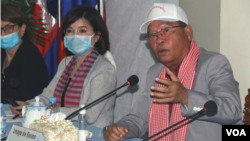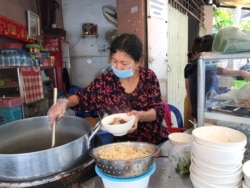The Cambodian Ministry of Health said Monday there were no new cases of the novel coronavirus, marking the 15th day without an infection, with health officials warning against complacency and calling the situation “alarming.”
The World Health Organization (WHO) additionally said Cambodia needed to prepare for a “long-term battle” because the threat of the novel coronavirus was not going away soon.
The Health Ministry reported no new cases of the viral disease on Monday, making it the 15th consecutive day there was no new incident of the virus. The national tally remains at 122 cases, with 119 recoveries, leaving only three people in the hospital receiving treatment.
At the Health Ministry’s weekly press conference, Minister Mam Bunheng said there was no scope for complacency as Cambodians and businesses attempted to return to normalcy.
“Don’t get confused that Cambodia has no more COVID-19,” he said.
“Only be vigilant to prevent community transmission.”
Or Vandine, a Health Ministry secretary of state, said the viral respiratory disease can spread very fast, calling on people to continue to be vigilant despite no new reported cases.
“We are still in an alarming situation that we need to be vigilant as always, ” she said.
World Health Organization country representative Dr. Li Ailan said Cambodia was likely in the “early stage” of the pandemic, calling Cambodia to be ready for a “long-term battle.”
Dr. Ailan said there were five factors when considering restoring businesses and public activities: control over new transmissions, preparedness in the public health system, lowering the risk of new outbreaks, workplace preventive measures, and lowering the risk of imported cases.
“Moving forward, we are talking about reopening businesses and lifting the restrictions, I do see the risk of importation of cases if we do not manage it well. And we do see the risk of local transmission,” she said.
Dr. Ailan said the Cambodian population needed to continue to maintain social distancing and hygiene recommendations, even if there were no new cases.
WHO was also working with stakeholders to scale up testing capabilities at provincial facilities, in preparation for a potential increase in new cases.
Dr. Laurence Baril, head of the Institut Pasteur du Cambodge, asked citizens to adapt to the new “normal,” adding that failure to follow health and safety guidelines could lead to a second wave of infections.
“I think it is important to understand that there will be no [going] back to normal. Even if we have zero cases there will be no [going] back to normal,” she said.
“If we forget that we will have a difficult second wave. We have the experience of other countries.”
Ministry figures showed that 11,576 tests had been conducted since January, up from the 9,792 tests reported last week. This shows that only 1,700 tests were conducted last week, despite having the capacity to conduct up to 600 tests a day.
Ly Sovann, spokesperson for the Health Ministry, said Cambodia was conducting 723 tests per million people, calling it “moderately high.” He added that Cambodia had “early warning systems” to trace potential infections.
“So far we haven’t seen any unusual increases of the respiratory disease,” he said. “We don’t have community transmissions. We barely have [COVID-19] since we don’t have any positive cases.”
Duong Sreypov, a coffee seller in Phnom Penh’s Daun Penh district, said on Monday that she has reopened her stall last week because it was now safe and there were no concerns from the disease.
"I think it is safe enough. My customers told me to come back,” she said, adding that she had closed her stall on April 1.
But Pin Nary, a noodle and rice porridge seller, said despite concerns over the virus, she had no option but to open. This was due to the financial strain her family was experiencing.
“We have spent all the money and we are afraid of losing customers,” she said. “I am afraid that [the outbreak] could happen again. When I go to the market I always wear a mask and [other] protection.”





